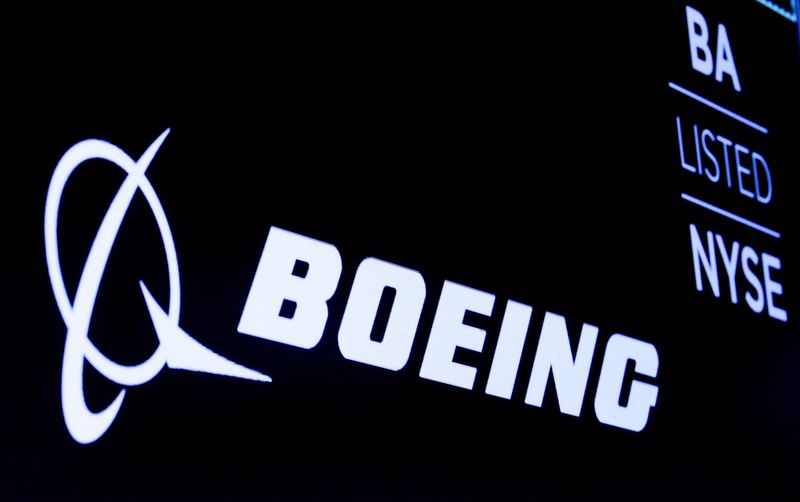Investing.com -- Boeing's (NYSE:BA) efforts to stabilize its financial position amid challenging market conditions have intensified following a recent equity raise, but analysts at Wells Fargo suggest that asset sales could provide critical support to the company’s balance sheet.
Currently, Boeing’s credit rating sits just above high-yield status, with negative outlooks across major rating agencies, signaling a need for substantial improvement to maintain its investment-grade status through 2027.
Wells Fargo notes that Boeing's leverage, interest coverage, and cash flow-to-debt ratios are well below the standards for investment-grade companies.
While the recent capital infusion from the equity raise may avert an immediate downgrade, Boeing still faces ongoing pressures to address its substantial debt load and constrained cash flow.
Boeing has about $16.5 billion in debt maturing through 2027, with a current blended interest rate of 3.5%.
If Boeing were forced to refinance this debt at high-yield rates, Wells Fargo estimates that the additional interest cost could reach about $600 million over the next three years, with $100 million in added interest in 2025, escalating to $300-400 million in 2026 before tapering off in 2027.
Although the equity raise provides some relief, further improvements are necessary to enable Boeing to manage or pay down this debt without incurring these higher costs.
Any further production or operational disruptions could hinder Boeing's ability to service this debt, thus amplifying the financial pressure.
In light of these challenges, Wells Fargo suggests that asset sales could help Boeing speed up its financial recovery, potentially pulling forward its timeline for credit metric improvement by about a year.
Specifically, analysts identify several segments that could be suitable for divestiture, including Boeing’s space operations, Jeppesen (a provider of data and planning services for aviation), and portions of its KLX and Aviall distribution businesses.
Together, these assets could yield proceeds in the high-single-digit billion-dollar range, while having a limited impact on Boeing’s annual free cash flow.
For instance, selling these units might result in a cash flow reduction of less than $500 million annually, a trade-off Wells Fargo considers favorable if it helps to expedite Boeing’s path to financial stability.
The space segment, including Boeing’s share in United Launch Alliance (ULA), could be particularly attractive to buyers within the defense industry.
As per Wells Fargo, this segment contributes roughly $2-3 billion in revenue, yet operates at low or negative margins, which could make divestiture less painful for Boeing’s overall profitability.
Jeppesen, a service provider Boeing acquired in 2000, could also be valued at around $3 billion based on sector comparables and its expanded workforce since the acquisition.
Similarly, Boeing’s KLX and Aviall businesses, which primarily focus on parts distribution, may no longer align with the company's core strategy, especially for non-Boeing aircraft support, and could be sold to free up additional capital.
Together, these divestitures would allow Boeing to realign its focus on its core operations—commercial aircraft and defense manufacturing.
Although these asset sales appear promising, they come with challenges. Limited disclosure around each segment complicates accurate valuation, and Boeing might face tax implications that could diminish the net proceeds.
Additionally, the aerospace giant must balance divestitures with its ongoing operational demands.
Wells Fargo cautions that these transactions need to be managed carefully to avoid destabilizing core operations, particularly as Boeing faces additional risks, such as technical and regulatory challenges on its key aircraft models, ongoing labor negotiations, and integration hurdles with acquired entities.
These factors could all affect Boeing’s cash flow and ability to meet debt obligations.
Despite these potential complications, Wells Fargo estimates that if Boeing can execute its divestiture strategy effectively, the timeline for restoring its credit metrics could be shortened.
Achieving investment-grade metrics by 2026, rather than the current projection of 2027, would provide a critical buffer against downgrades and allow Boeing to maintain a more favorable cost of capital. This could not only reduce interest expenses on future debt but also make Boeing’s stock more attractive to institutional investors.
Wells Fargo’s conservative outlook on Boeing is evident in its revised price target of $85 per share, down from prior estimates and well below the current market price.
This target reflects the analysts' assessment that Boeing’s near-term upside is constrained by ongoing financial and operational challenges.
While asset sales could improve Boeing’s financial position, the benefits are largely contingent upon Boeing’s ability to execute these sales efficiently and manage the proceeds to reduce debt without impairing essential functions.
